Frozen 2 and the Ambiguous Calling
Part 4 of the series How to be yourself, with help from Disney/Pixar (Thinking about Identity and the Inner Voice)
At the end of Frozen all the heroes were happy. So, naturally, there needed to be a sequel to fix this.
Frozen 2 is not up to the standards of its predecessor. Its animation is beautiful, making use of the technological advances since the first movie, but its plot is not as cohesive and the songs are weaker. I described Frozen as solid, so I guess this one is a bit squishy.
In my previous post I tried to show that when it comes to the question of whether I should listen to an inner voice or follow an external source, Frozen offers ambiguous advice. Frozen 2 continues the tradition.
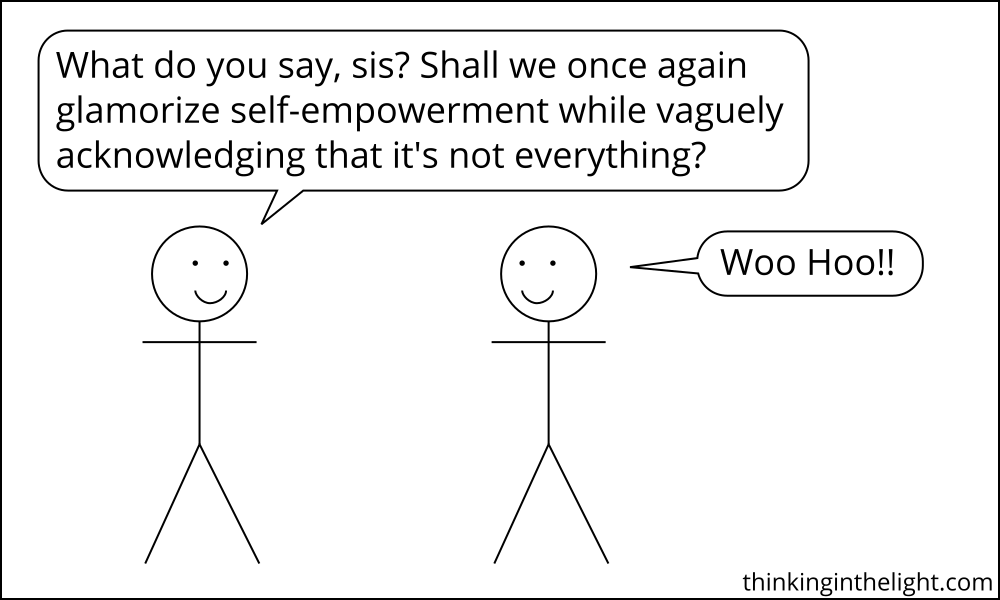
The sequel also adds (spoiler alert) a topic I explored earlier in this series—the idea of a calling. Elsa hears a mysterious voice call to her, and a large part of her story is solving this mystery by searching for the caller. This call creates the emotional pull of her narrative—to the extent that Frozen 2 has an emotional pull (squish squish)—so it is worth considering how the movie conceives of it.
In an article discussing Elsa’s calling, Joey Tomassoni argues that “Into the Unknown,” the song where Elsa first responds to the call, is a song that embodies a desire for transcendence. Tomassoni points out that the song is directed at a “You” and comments that “we might consider this ‘You’ a ‘Thou’ of sorts—a kind of unknown divine being or force.” He ultimately sees listeners responding to this song because of the human longing for God.
I don’t want to dispute that Frozen 2 is playing off of this desire for transcendence—or at least a desire for something greater than ourselves. This desire is why the idea of a calling is attractive. We tell ourselves stories where we are called by God to follow him or by our country to serve it—tales that merge our story into something grander. Whether it is in terms of religion, vocation, or something else, we like this idea of being drawn into something bigger than us.
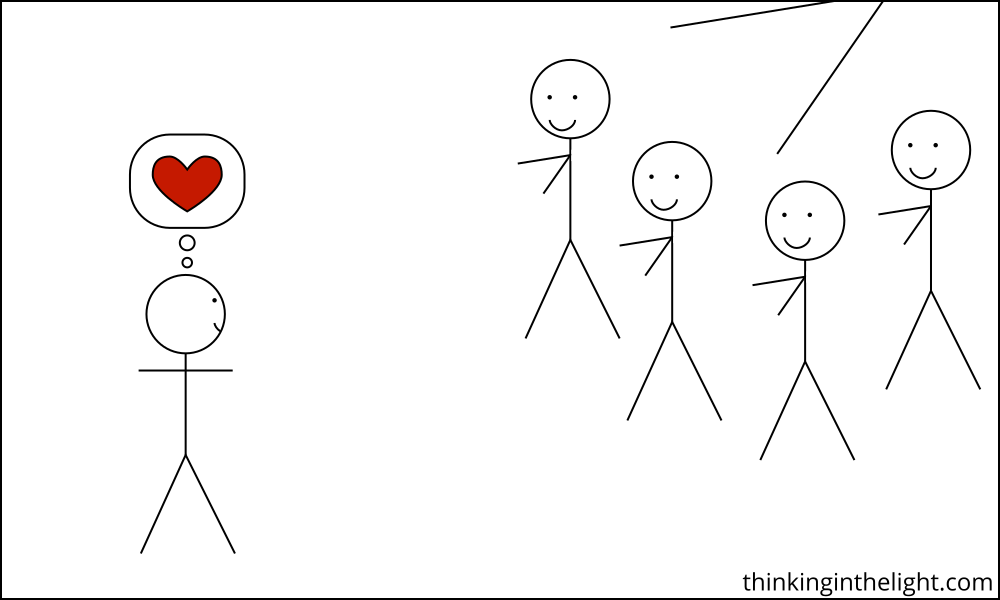
When something larger than me calls me, this expands my identity. Now I am not just myself, but I am someone united in a cause with others or someone under the care of God. By having my identity rooted in something that transcends me, it gives me a greater significance than I had on my own.
Frozen 2 is relying on this desire for something greater, something that expands our significance. It is important to note, however, that transcendence is not all the movie has in view. The import of Elsa’s calling is ambiguous. At the same time that it draws on the desire for something bigger than her, the story of her call also points her towards herself. (And this ambiguity is only exacerbated by the story’s lack of clarity, discussed below, as to who the voice is coming from.) In particular, her identity does not become expanded by attaching herself to something outside of herself, but it expands by more fully realizing who she already is. When it comes to Elsa’s calling, Frozen 2 appears to be gesturing towards a kind of self-transcendence.
To begin to see the self-focus of the call, it is worth noting what it calls her away from and what it calls her towards. Regarding the first, she is currently queen of the kingdom and living with her friends. This is a good situation, and the voice is tempting her to leave it.
Everyone I’ve ever loved is here within these walls
I’m sorry, secret siren, but I’m blocking out your calls
I’ve had my adventure, I don’t need something new
I’m afraid of what I’m risking if I follow you
Into the unknown
What the voice is calling her toward is less concrete. The call primarily appeals to Elsa’s feelings, particularly to her sense of identity.
Or are you someone out there who’s a little bit like me?
Who knows deep down I’m not where I’m meant to be?
Every day’s a little harder as I feel my power grow
Don’t you know there’s a part of me that longs to go
Into the unknown
Her power makes her feel different and she wants to find someone like herself in a place she fits in. Or in other words, her inner voice is saying her identity would be more fully actualized elsewhere.
The call, then, presents Elsa with a choice of what to prioritize: her external relationships to others or her identity as determined by her inner voice. It is drawing her towards the latter.
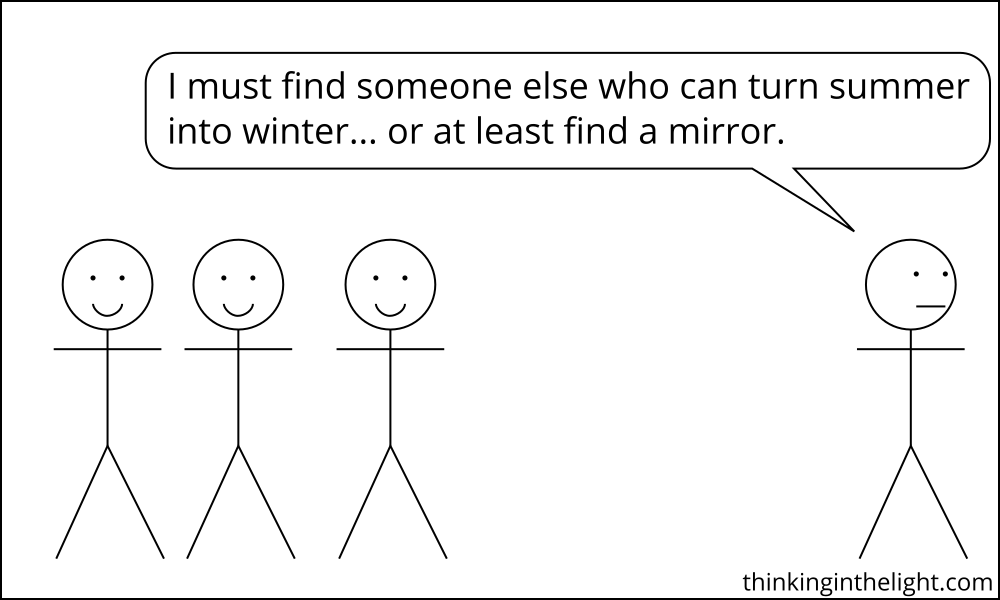
Or at least this is its draw at the beginning of the movie. Elsewhere, following the call is described in a less self-focused way. Right after Elsa hears the call, everyone in the kingdom is magically kicked out of it. As the heroes venture forth to fix this situation they also end up taking on the task of freeing an enchanted forest. And when Elsa speaks to the forest-dwellers, she puts her quest for the voice’s source in terms of helping them: “Someone has called me here. If I can just find them, I believe they have the answers that may help us free this forest.”
But the focus shifts again when she finally reaches the destination where the voice originates. She sings “Show Yourself,” a song that starts out as an appeal for the mysterious caller to be revealed.
Show yourself
I’m dying to meet you
Show yourself
It’s your turn
Are you the one I’ve been looking for
All of my life?
Show yourself
I’m ready to learn.
If we just look at this portion of the song, the message fits with the desire for transcendence discussed earlier. Elsa could be responding to the call by seeking to join and to learn from a being that is bigger than herself. As the song continues, however, the focus moves to Elsa.
I’ve never felt so certain
All my life, I’ve been torn
But I’m here for a reason
Could it be the reason I was born?
I have always been so different
Normal rules did not apply
Is this the day?
Are you the way
I finally find out why?
Here she is still seeking the voice, but it is not the greatness of the voice that is drawing her. Instead, it is Elsa’s own uniqueness. And by the end of the song the focus is clearly on Elsa.
Actually, in one sense the end of the song is totally unclear. This is because, despite having watched the movie twice, I’m still not sure who the caller is. Just prior to the song’s end, Elsa finally reaches the source of the voice, and it is… her mother… who is dead. Or at least it is a picture of her mother. Or a memory of her? And it was also declared earlier in the movie that the voice belongs to the fifth nature spirit who unites earth, air, water, and fire. So maybe Elsa was called by nature? But then this fifth spirit turns out to be… Elsa. So maybe she is a spirit who is her own mother and called herself without realizing it???
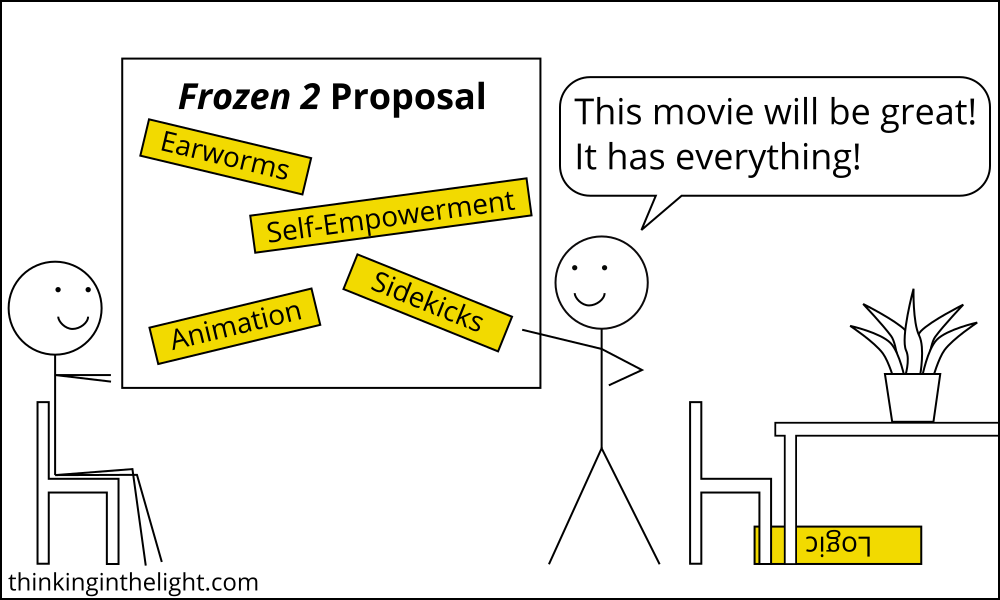
Anyway, setting aside the movie’s total lack of clarity regarding the source of the voice, by the end of “Show Yourself” it is clear that the song is not about a transcendent caller who is bigger than Elsa. It is about the great power that is within herself. As she lets loose her powers and clothes herself in a new dress symbolic of her role as the fifth spirit, she and the voice sing:
Show yourself
Step into your power
Grow yourself
Into something new
This is no longer Elsa asking for a transcendent being to reveal itself. It is Elsa showing herself that she has power she didn’t know of and preparing to show herself to the world as the powerful person she is. And in response to Elsa’s previous question as to whether the voice was the one she has been looking for all of her life, the mother/spirit/memory/voice tells Elsa:
You are the one you’ve been waiting for
So if the calling in Frozen 2 is a desire for transcendence, it is ultimately a desire for a kind of self-transcendence. It is not wanting to attach myself to something bigger than me, something that will expand my identity through the attachment. It is wanting to find that the greatness is already latent within myself. I just need to listen to the inner voice and discover my true identity, one that is more expansive than I originally thought.
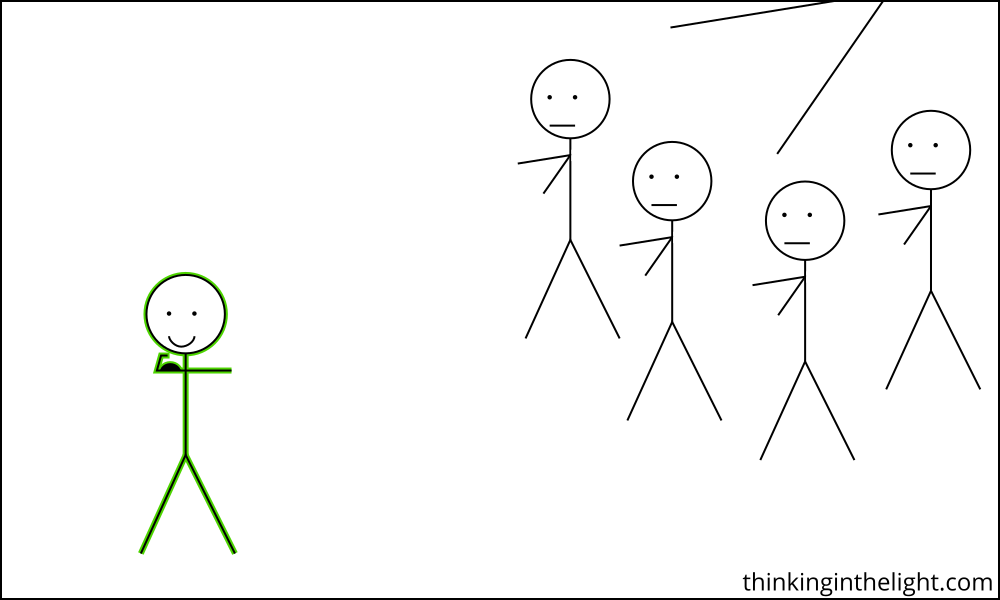
If I have correctly identified the various messages in Frozen 2 regarding the idea of a calling, I want to point out two ambiguities in this message.
First, it is not clear how the call is supposed to work. It comes from a physical voice that is outside of Elsa, and the movie makes use of the desire for transcendence this evokes. However, at the same time, the end result is to have Elsa dig down and bring out what she already was. So as viewers should we understand a calling to be something that calls me out of myself or into myself, something that alters my identity or that reaffirms it?
Another way to express this ambiguity is to return to the notion of self-transcendence. This seems as though it is potentially an incoherent concept. If I am called by God or by a cause, it is clear how these things are bigger than me and how my identity expands when I identify with them. But can I be called to something greater than me when that something is already within me? Maybe there is a way to answer this question and the others above in a way that is satisfying, but Frozen 2 would need to do more in order to do so. Right now its position is ambiguous, since it is combining strains of transcendence-seeking and self-empowerment.
Second, when seeking the voice, is Elsa’s goal self-discovery or helping others? She sings to herself in terms of how the search impacts her, but as I mentioned, she also speaks of it as a search that will help the people in the forest. Additionally, after she realizes she is the fifth nature spirit and becomes empowered, she goes on to save the day and protect her kingdom. Her motivation is ambiguous. However, putting it all together the thrust of Elsa’s story appears to be similar to the one observed in Moana: focus on your inner voice and finding who you truly are, and it is by doing this that you will help others.
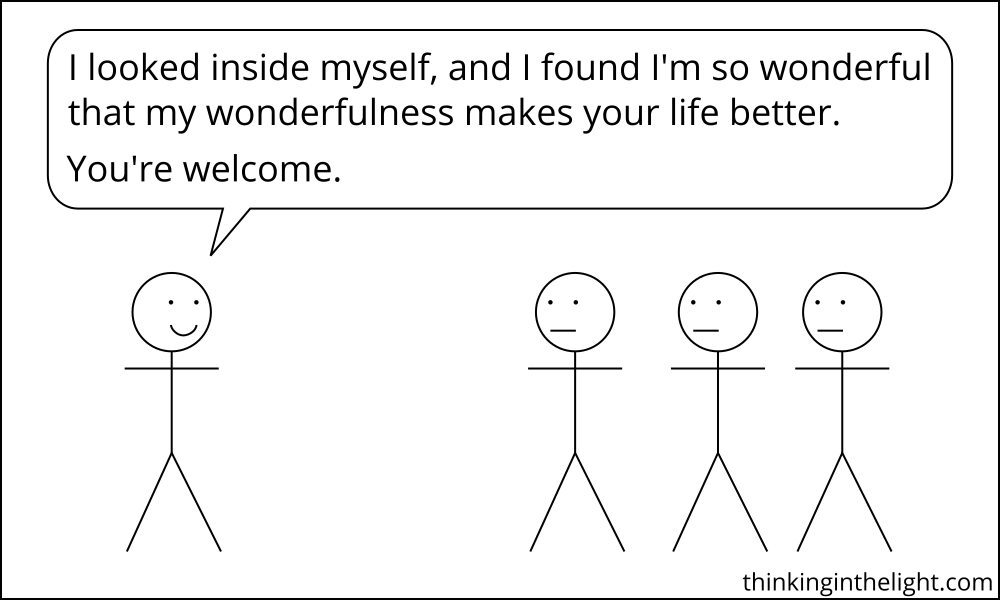
As I argued in the previous post, however, the story of the first Frozen calls this message into question due to the way that a self-focus often harms others instead of helping them. In fact Frozen 2 also has an element that runs counter to this message—Anna’s story. She helps others not by looking within but by turning away from herself and her desires.
Anna begins her story right where she wants to be. She is living with her sister and their friends, and she doesn’t want things to change. Unfortunately for her, things do change, and as her story progresses she slowly loses each of her companions. At the turning point of her narrative arc she is left alone, devastated by their loss. Not only this, but the thing she needs to do—the thing that will bring freedom and right wrongs—this action will destroy Arendelle, her home. At this point she sings the song “The Next Right Thing,” a song that I suspect was not as popular with kids as the self-empowered “Let It Go” from the first Frozen.
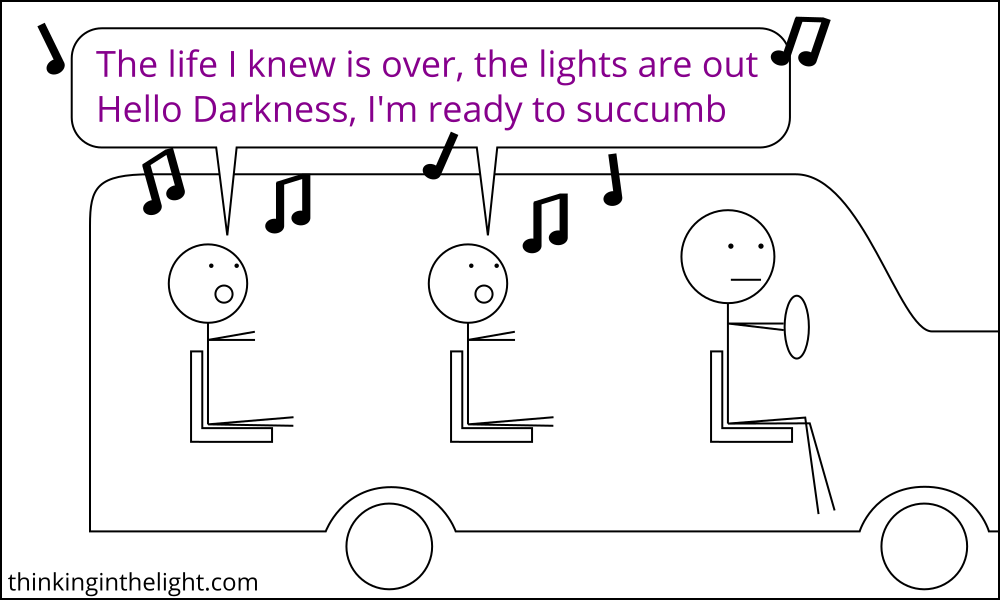
In the song Anna exhorts herself to keep going, despite the fact that she has no personal motivation to do so.
I won’t look too far ahead
It’s too much for me to take
But break it down to this next breath, this next step
This next choice is one that I can make
So I’ll walk through this night
Stumbling blindly toward the light
And do the next right thing
Anna is not listening to an inner voice but guiding her actions by an external morality. This is so, despite the fact that the song mentions a voice in her mind.
This grief has a gravity, it pulls me down
But a tiny voice whispers in my mind
“You are lost, hope is gone
But you must go on
And do the next right thing”
This voice is, as in Pinnochio, a term for the conscience. It is not having her turn inward and examine who she is, but it is prompting her to turn outward, away from the things she wants, and do the right thing instead. And it is by doing this that she frees the people trapped in the forest.
So we are left at the end not knowing whether we should serve others by self-sacrifice or self-focus, and we are left wondering whether we should seek a transcendent greatness or an internal one. The messages of Frozen 2 are ambiguous.
And with that I am finally done with the world of Frozen. (And with obsessing for weeks over how to write clearly about things that are ambiguous!) In the next post I will switch gears and address the question of what it might mean to turn to an external morality, rather than listen to my inner voice, and I will do so with the help of two not-yet-friends.
Share this post or sign up for future posts:
Bibliography:
- Frozen 2. Walt Disney Animation Studios, 2019.
